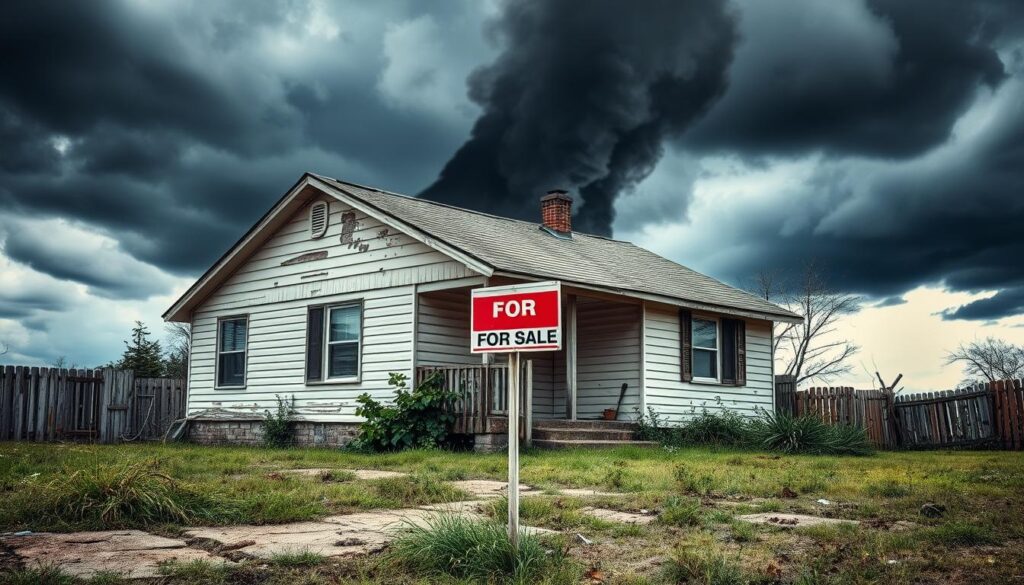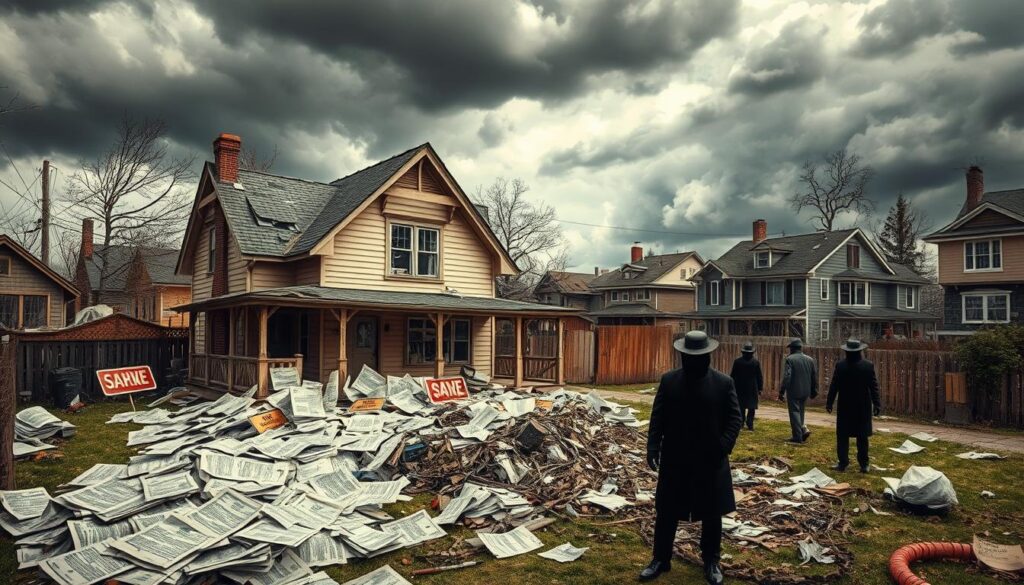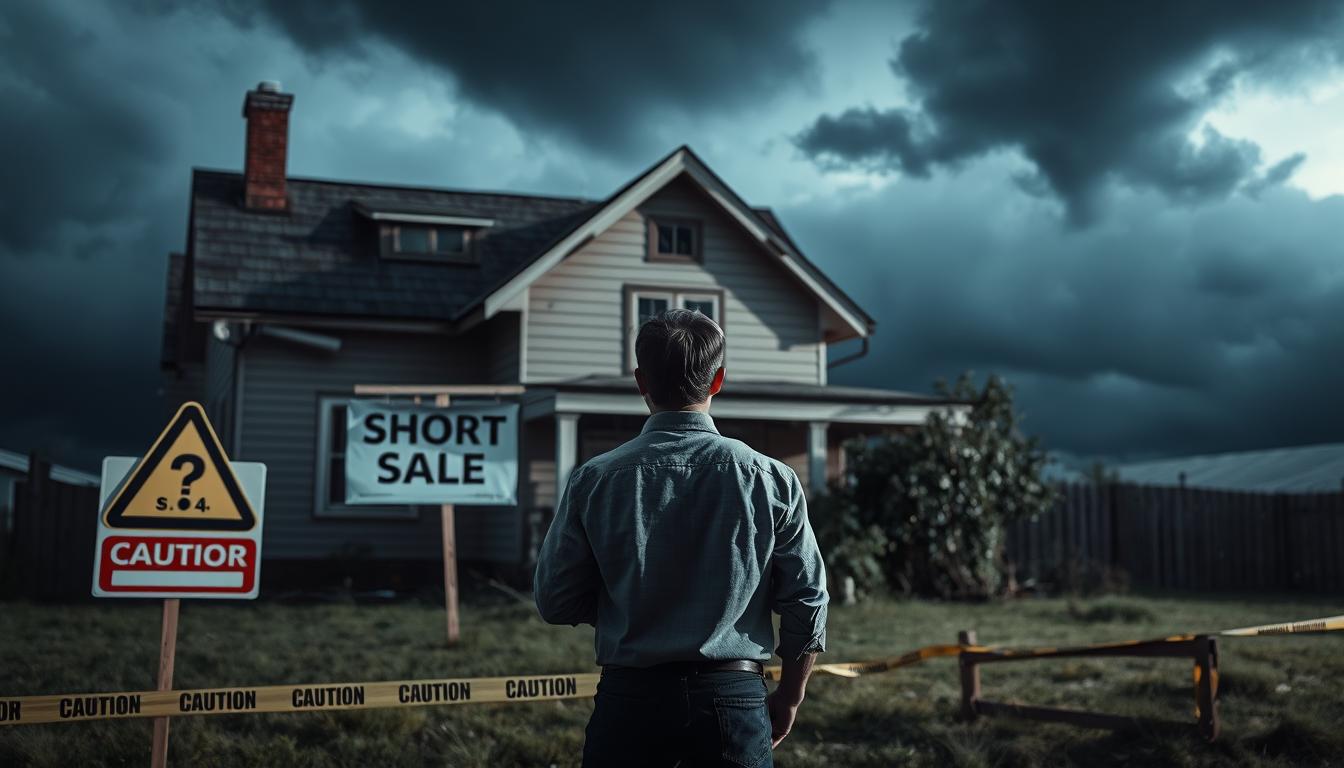Are you ready to face the challenges of buying a short sale home? It’s not just about getting a good deal. The risks of buying a short sale home can be big. Homeowners sell their homes for less than they owe, which might sound good. But, there are risks like long approval times, unknown property conditions, and missing out on better deals.
Knowing these risks can help you make a smart choice. It could mean the difference between a good investment and a bad one. Let’s explore what buying a short sale home really means.
Key Takeaways
- Short sales allow homeowners to sell for less than the mortgage owed, often due to financial hardship.
- The approval process for short sales can be unpredictable and lengthy, taking from months to over a year.
- Buying a short sale property typically involves purchasing the home “as is,” which can lead to potential repair costs.
- Homeowners must demonstrate financial hardship for a short sale to be approved by lenders.
- Working with experienced professionals during a short sale can help navigate potential pitfalls.
- Understanding the risks of buying a short sale is essential to making a wise investment.
Understanding Short Sales in Real Estate
Learning about short sales is key in today’s real estate world. A short sale happens when a lender agrees to accept less money than what’s owed. This lets homeowners sell their property without facing foreclosure’s harsh effects.
Definition of a Short Sale
The definition of a short sale is about helping sellers in tough financial spots. It lets them sell their homes without going through foreclosure. Getting the lender’s okay is crucial, making short sales different from foreclosures.
Unlike foreclosure, where lenders take the property, short sales involve negotiations. Sellers try to sell their homes for less, with the lender’s agreement.
How Short Sales Differ from Foreclosures
It’s important to know the differences between short sales and foreclosures. Short sales let sellers list their homes and possibly sell for less. Foreclosures, on the other hand, start a legal process where lenders take the property.
Foreclosures can leave homes in bad shape, as sellers often want to sell fast. Short sales might mean selling ‘as is,’ but they offer a chance to buy at a lower price.
The Potential for Financial Savings
Buyers look at short sales for the chance to save money. These homes are often priced lower than market value. This gives buyers a chance to get a good deal.
Distressed homeowners want to sell quickly, which can lead to better offers. However, getting the best deal might take time due to competition.
Risks of Buying a Short Sale Home
Short sale real estate offers great rewards but also comes with risks. It’s important to know these risks before diving in. Buyers should be ready for challenges like an unpredictable approval process, property condition worries, and the time it takes to buy a short sale home.
Unpredictable Approval Process
The approval process for short sales can be unpredictable. Buyers might wait for weeks or months for their offer to be approved. Issues like lender delays, multiple liens, and seller documentation needs can slow things down.
This waiting can be frustrating. It might cause buyers to miss out on other good opportunities.
Property Condition Concerns
Short sale homes often have poor conditions. Distressed sellers may not take care of the property. Buyers should be prepared for costly repairs.
It’s key to understand the property’s condition before buying. This can help avoid extra financial stress.
Time Investment and Lost Opportunities
Buying a short sale home requires a lot of time. This can mean missing out on other properties. The process involves negotiations and paperwork, taking months to complete.

Key Factors to Consider When Buying a Short Sale
Buying a short sale home involves several key factors. It’s crucial to accurately assess the property’s value. Short sale prices might not reflect the true market value. Working with experienced professionals can help speed up the process.
Home inspections are also essential. They help identify any structural issues or maintenance needs before you buy.
Assessing Property Value
Before making an offer, it’s important to research the property’s value. This research can help you negotiate a better price. Real estate agents with short sale experience can provide valuable insights.
Working with Experienced Professionals
Working with professionals who know short sales is crucial. They understand the unique challenges of short sales. Their expertise can help with negotiations and navigating lender requirements.
Conducting Comprehensive Inspections
Inspections are key when buying a short sale. They help avoid unexpected costs later. Inspections can reveal hidden problems like water damage or electrical issues. Skipping this step can lead to costly repairs after you buy.
| Factor | Description | Importance |
|---|---|---|
| Property Value Assessment | Determining the fair market value to guide your offer | Essential for negotiating a good price |
| Professional Guidance | Involving seasoned agents who specialize in short sales | Enhances transaction smoothness and efficiency |
| Home Inspection | Comprehensive evaluation of property condition | Prevents unexpected repair costs post-purchase |
For more detailed information regarding the complexities of short sales, consider exploring this resource.
Common Pitfalls of Buying a Short Sale Property
Buying a short sale property might seem good, but it comes with its own set of challenges. Knowing these challenges can help you make better choices and have a successful deal.
Underestimating Repair Costs
One big worry for buyers is not realizing how much repairs will cost. Many short sale homes need a lot of work because they were not well taken care of. Buyers might see the lower price but forget about the repairs needed, leading to extra costs later on. It’s important to figure out these costs before buying to manage your investment well.
Potential for Multiple Lien Issues
Dealing with lien issues in short sales can make things complicated. Buyers need to do a title search to find any hidden liens or problems with the property. If there are many debts, getting approvals from all lenders can slow down or stop the sale. This can make a simple deal into a big legal problem.
Lender Preferences for Cash Buyers
Lenders often like cash buyers more because they seem less risky. Cash offers are attractive to sellers who need to sell fast, as getting financing can take a long time. Buyers who need loans might find it harder to compete, which could mean missing out on good deals.

Understanding these common problems can help buyers plan better when looking at short sales. Knowing about repair costs, lien issues, and lender preferences for cash buyers can make you more ready for negotiations. Being informed can make your buying experience better and more successful.
To learn more about short sale properties, visit this helpful resource.
Conclusion
Buying a short sale home might save you money, but it comes with risks. You need to know about the unpredictable approval process and possible repair issues. Also, the negotiation time can be long, making it seem like a bad deal.
To avoid problems, do your homework well. Work with experts like real estate agents and financial advisors. They can help you through the tough parts of these deals. Also, get a home inspection to know the property’s real condition.
By understanding the pros and cons of short sale properties, you can make smart choices. This way, you can reach your financial goals. For more tips on buying these properties, check out this resource.






